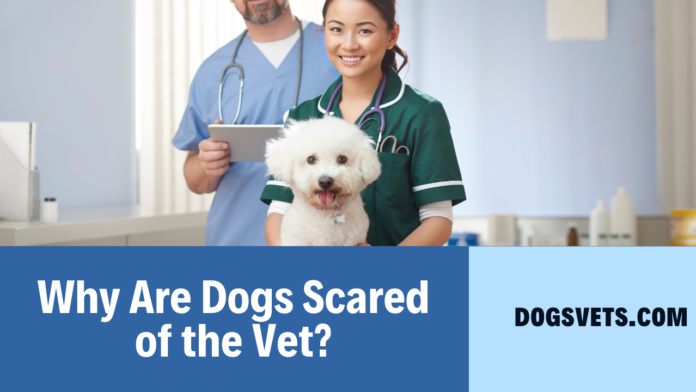Last Updated on April 11, 2024 by Dog Lover
Why Are Dogs Scared of the Vet? Decoding Your Pup’s Fear and Making Visits a Breeze
Let’s face it, taking your beloved dog to the vet isn’t always a walk in the park (pun intended).
While some pups trot through the clinic door with wagging tails, many others turn into quivering puddles of anxiety.
Canine vet fear is a real issue, and understanding why it happens is the first step to making vet visits a positive experience for both you and your furry friend.
In this comprehensive guide, we’ll delve into the world of dog emotions, exploring the reasons behind vet anxiety and uncovering tips to transform those dreaded trips into tolerable, even enjoyable, outings.
So, grab your leash, a handful of treats, and an open mind – it’s time to conquer canine vet fear!

Decoding Doggy Discomfort: A Multifaceted Fear
Can you imagine being whisked away to a strange land filled with unfamiliar sights, sounds, and smells?
This is essentially what your dog experiences during a vet visit. Here’s a breakdown of the key factors contributing to their fear:
- The Unknown: Veterinary clinics are a sensory overload for dogs. The sterile environment, pungent cleaning chemicals, and cacophony of barking and meowing can be overwhelming for a pup accustomed to the comfort of home.
- Unpleasant Past Experiences: Did a previous vet visit involve painful injections or scary procedures? Dogs have excellent memories, and a negative experience can leave a lasting impression, making them dread future visits.
- Separation Anxiety: For many dogs, being separated from their beloved humans is a major source of stress. The vet’s office, with its unfamiliar faces and procedures, can exacerbate this anxiety.
- Restraint and Handling: Being held down or restrained by unfamiliar people can be frightening for dogs, especially those who haven’t been properly socialized.
- Pheromones: Animals communicate through scent, and veterinary clinics are filled with the pheromones of stressed and anxious animals, further fueling your dog’s unease.
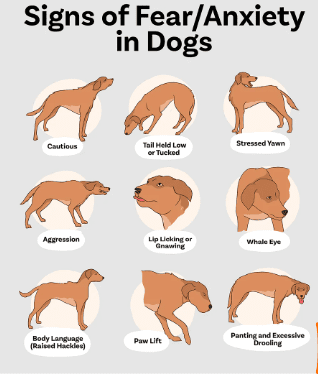
More Than Meets the Eye: Recognizing Signs of Fear
Not all dogs express fear in the same way. While some become visibly frantic, others might exhibit more subtle signs.
Here’s what to watch out for:
- Physical signs: Panting, excessive drooling, trembling, flattened ears, tucked tail, diarrhea, and vomiting are all common indications of canine anxiety.
- Behavioral changes: Whining, barking, pacing, trying to hide, or becoming aggressive are ways your dog might communicate their distress.
- Loss of interest in treats: Food is a powerful motivator for dogs. If your pup normally gobbles up treats but shows no interest at the vet’s office, it’s a sign of significant stress.
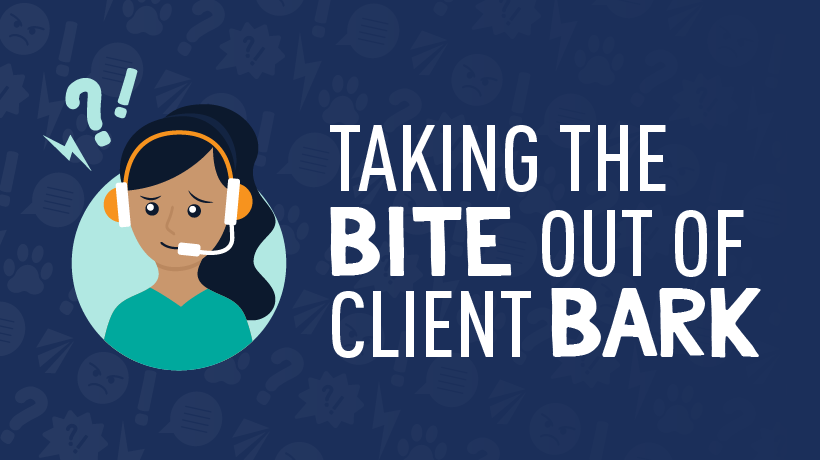
Taking the Bite Out of Vet Visits: Effective Strategies
Now that we understand the root of the problem, let’s explore some practical solutions to make vet visits less stressful for your dog:
Positive Reinforcement:
- Start Early: Introduce your puppy to the vet clinic during a non-threatening visit. Let them explore the environment, meet the staff, and receive positive reinforcement with treats and praise.
- Happy Associations: Practice handling your dog at home, mimicking what might happen during a vet visit (checking ears, lifting paws). Reward calm behavior generously with treats and praise.
- Treat Time: Bring your dog’s favorite high-value treats to the vet’s office. Reward calm behavior and use treats to distract them from stressful situations.
Desensitization and Counterconditioning:
- Gradual Exposure: Start with short visits to the vet’s office, gradually increasing the duration as your dog becomes more comfortable. Focus on positive experiences – treats, play time, and praise.
- Shifting the Focus: Pair a scary stimulus (like a vet tech in a white coat) with something positive (treats, praise, or a favorite toy). Over time, your dog will learn to associate the vet with good things.
Creating a Calm Environment:
- Advocate for Your Dog: Communicate your dog’s fears and anxieties to the vet staff. They can adjust their approach and minimize stressful procedures.
- Bring Comfort Items: A familiar blanket, toy, or even a pheromone spray can provide your dog with a sense of security during the visit.
- Request a Quiet Exam Room: If possible, ask for a quieter area away from the hustle and bustle of the waiting room.
Additional Tips:
- Exercise Your Dog Beforehand: A tired dog is a less anxious dog. Take your pup for a brisk walk or play session before heading to the vet.
- Stay Calm and Collected: Your dog picks up on your emotions. Project a calm and confident demeanor to reassure your furry friend.
- Consider Medication: In severe cases of vet anxiety, discuss medication options with your veterinarian. Anti-anxiety medication can help take the edge off and make the visit more manageable for your dog.
Building a Positive Relationship with Your Vet: A Collaborative Approach
Creating a positive and trusting relationship with your veterinarian is crucial for your dog’s long-term health.
Here’s how you can foster a collaborative approach:
- Find a Vet Who Specializes in Fearful Pets: Some veterinarians have experience working with dogs who exhibit anxiety. They can tailor their approach to minimize stress and create a more positive experience.
- Schedule Regular Check-ups: Don’t wait for a health concern to arise before taking your dog to the vet. Regular wellness visits allow your dog to become familiar with the clinic and establish a rapport with the staff.
- Open Communication is Key: Be upfront with your vet about your dog’s anxieties. Discuss your concerns and work together to develop a plan to manage their fear.
Beyond the Band-Aid: Addressing Underlying Issues
Sometimes, vet fear can be a symptom of a deeper problem, such as noise phobia, separation anxiety, or lack of socialization.
If your dog exhibits generalized anxiety, consider consulting a certified animal behaviorist to develop a comprehensive training and treatment plan.
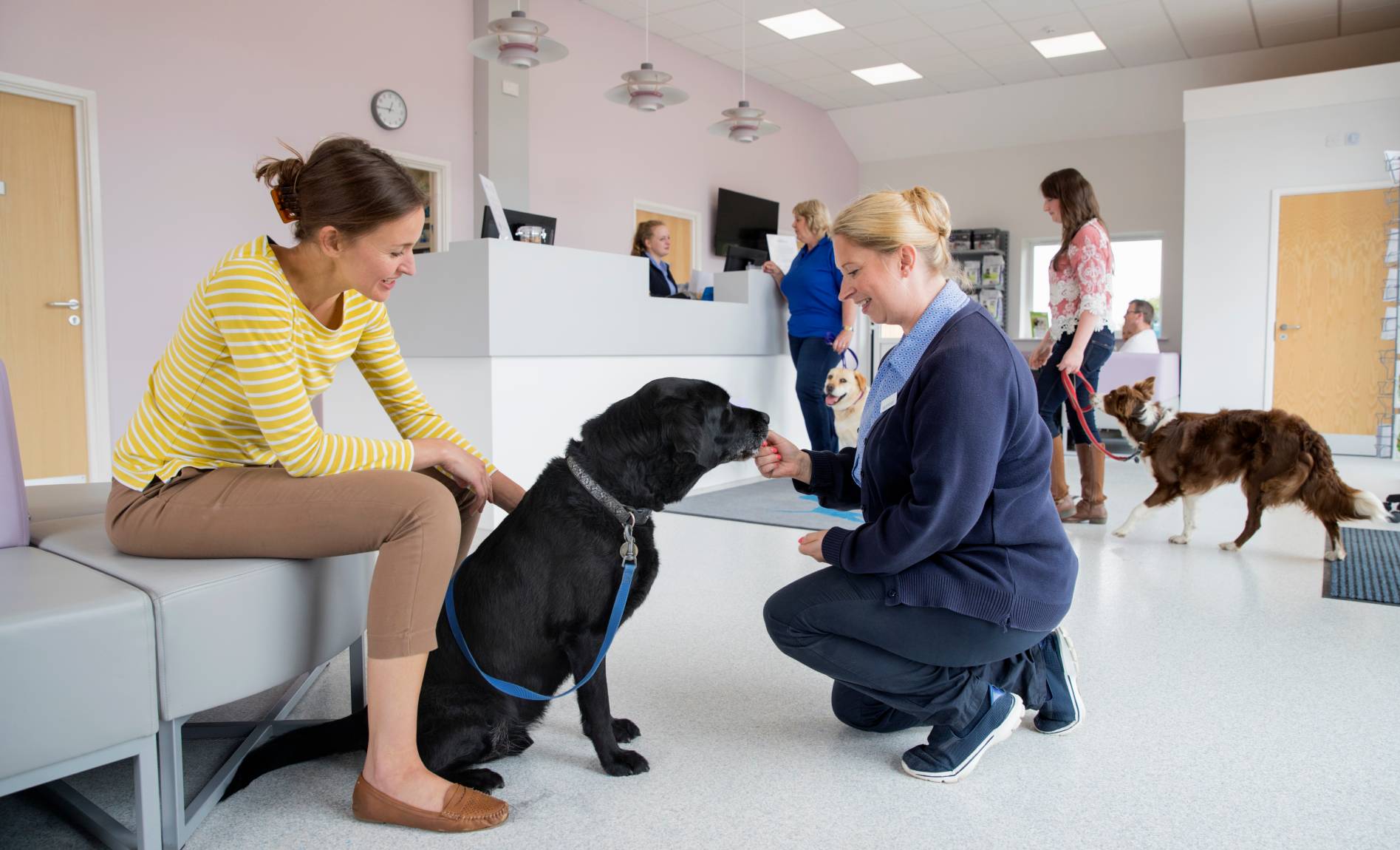
Celebrating Success: Rewarding Progress
Remember, progress takes time. Be patient with your dog and celebrate even small victories.
Positive reinforcement for calm behavior during vet visits will go a long way in building their confidence and reducing anxiety.
Here are some additional ideas for celebrating success:
- Spoil Your Pup: After a successful vet visit, reward your dog with their favorite toy, a delicious treat, or a special outing to the park.
- Positive Verbal Cues: Lavish your dog with praise and positive affirmations throughout the visit. Let them know they’re doing a great job!
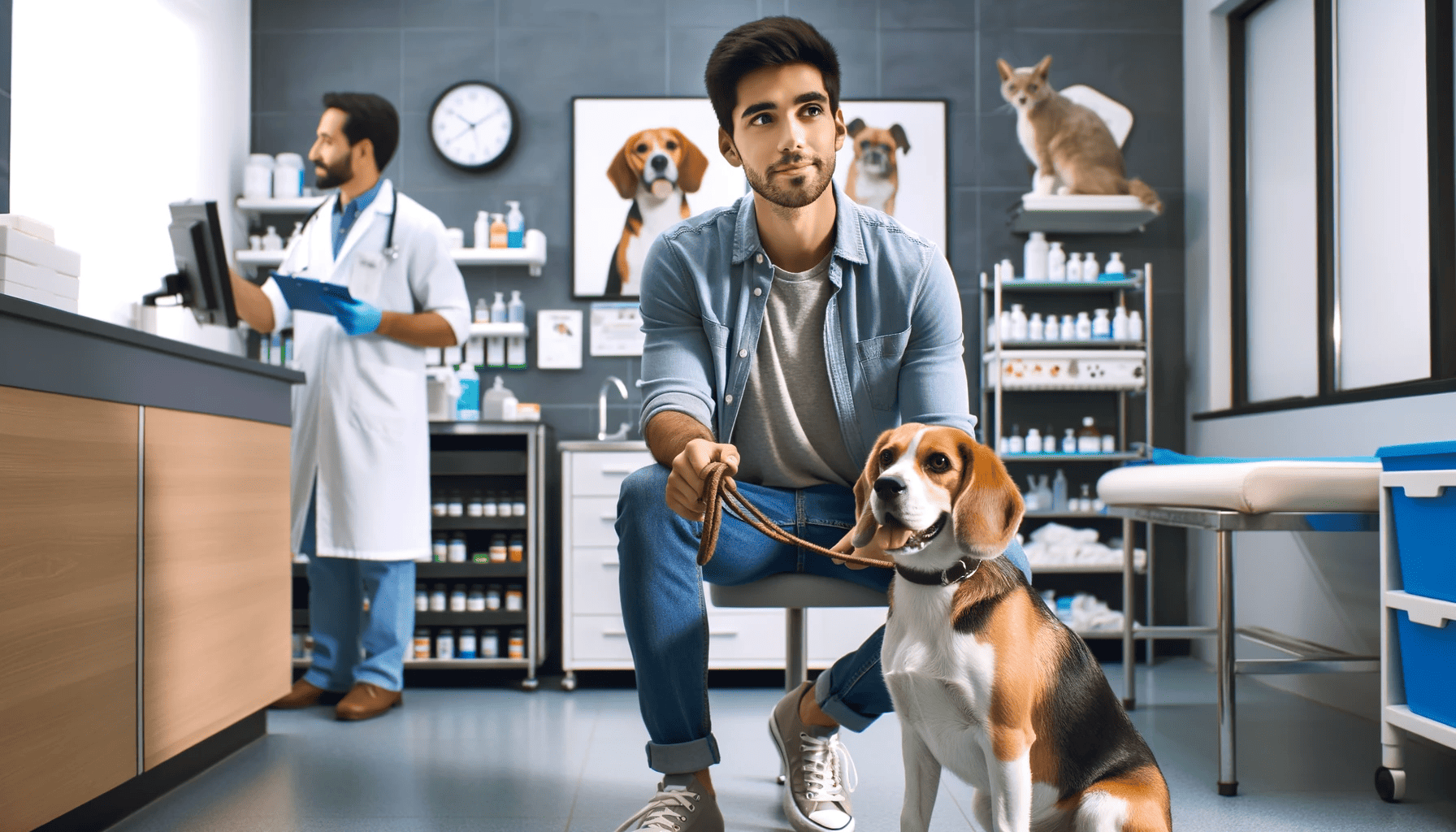
Conclusion: Transforming Vet Visits into Positive Experiences
With patience, understanding, and the right strategies, you can transform vet visits from stressful ordeals into positive experiences for your dog.
By creating a foundation of trust and positive reinforcement, you can ensure your furry friend receives the vital veterinary care they need to live a long and healthy life.
Remember, a happy and healthy dog is a happy and healthy pet parent too!
FAQs
What are some signs that my dog might be afraid of the vet?
There are both physical and behavioral signs to watch out for. Physical signs include panting, excessive drooling, trembling, and changes in appetite. Behavioral signs might be whining, barking, pacing, trying to hide, or even becoming aggressive.
How can I prepare my dog for a vet visit?
Start by introducing your dog to the vet clinic during a non-threatening visit. Practice handling them at home, mimicking what might happen during an exam. Bring their favorite treats and use positive reinforcement to create happy associations with the vet.
What should I do if my dog becomes very anxious at the vet’s office?
Communicate your dog’s anxieties to the vet staff. They can adjust their approach and minimize stressful procedures. Bring familiar comfort items and request a quiet exam room if possible. In severe cases, discuss medication options with your veterinarian.
How can I find a vet who specializes in fearful pets?
Ask your friends, family, or local animal shelters for recommendations. You can also search online directories for veterinarians who have experience working with dogs with anxiety.
Should I consider medication for my dog’s vet anxiety?
Medication can be a helpful tool in managing severe cases of vet anxiety. Discuss this option with your veterinarian to determine if it’s the right course of action for your dog.
Disclaimer: This article provides general information and should not be construed as veterinary advice.
Always consult with a qualified veterinarian to discuss your dog’s specific needs and health concerns.
Reference Links:
-
American Veterinary Medical Association (AVMA): https://www.avma.org/
- This website is a wealth of information on pet health and wellness, including articles on canine anxiety and vet visits.
-
The Association of Professional Dog Trainers (APDT): https://apdt.com/
- The APDT offers resources on positive reinforcement training techniques, which can be helpful in reducing vet anxiety.
-
College of Veterinary Medicine at Cornell University: https://www.vet.cornell.edu/
- This website has a section on behavior problems in dogs, including information on separation anxiety, which can be a factor in vet fear.
-
American College of Veterinary Behaviorists (ACVB): https://www.dacvb.org/
- The ACVB website provides a directory of veterinary behaviorists who can help develop a treatment plan for dogs with severe anxiety issues.
-
Veterinary Partner: https://veterinarypartner.vin.com/
- This website offers a variety of articles on pet health topics, including a section on helping pets feel comfortable at the vet.

